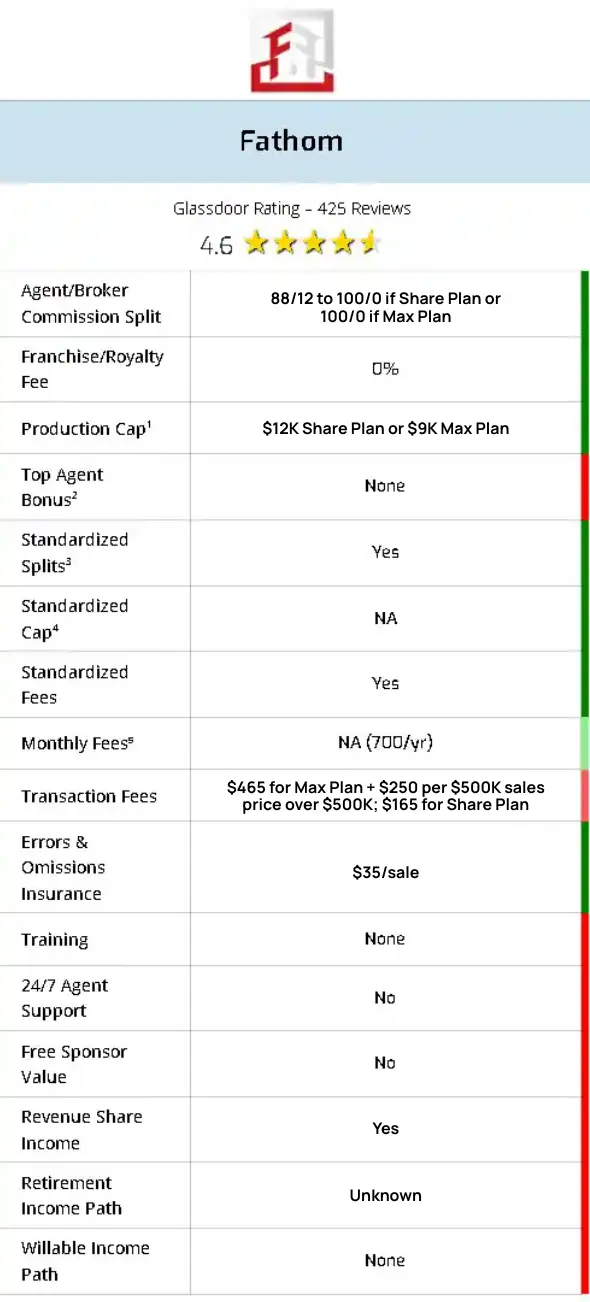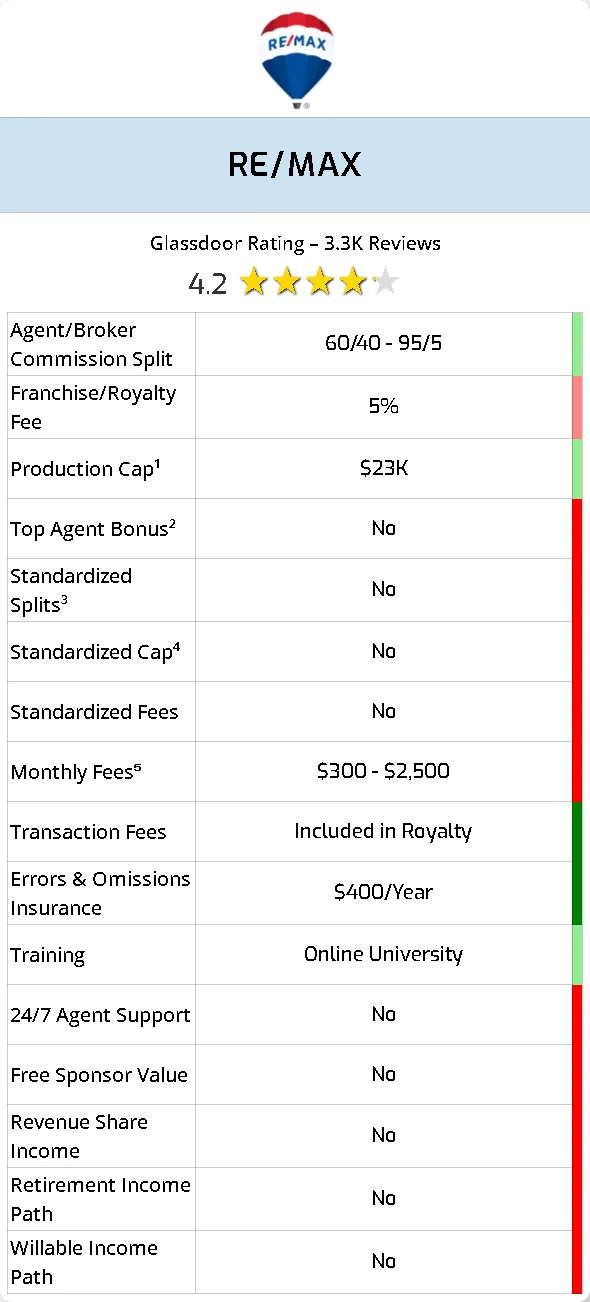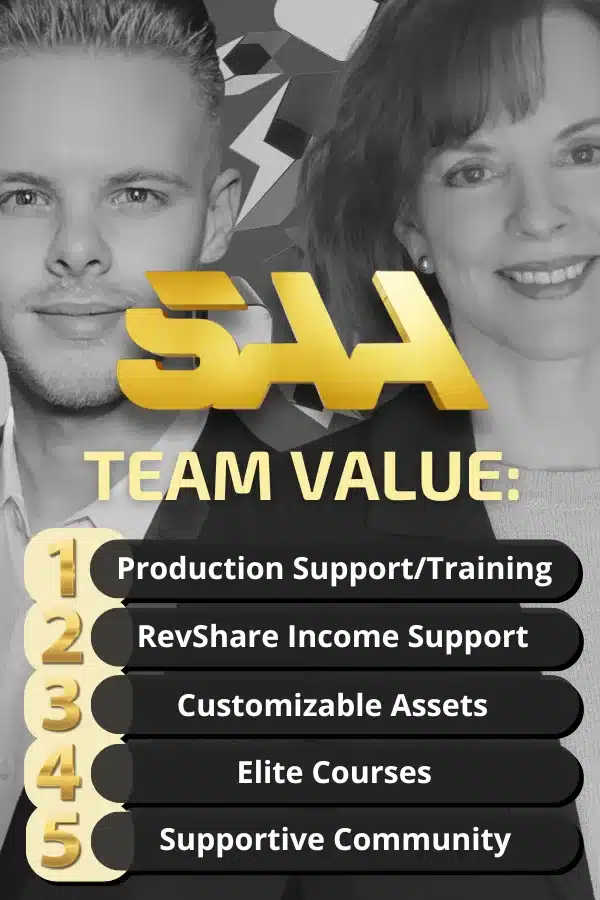

Choosing the right brokerage is one of the most important decisions in your real estate career. It’s not just about commission splits or monthly fees—it’s about finding a platform that lets you build income, grow faster, and scale with less overhead. In this article, we’re comparing two big names with very different approaches: Fathom Realty and RE/MAX.
Fathom promotes financial independence through a flat-fee structure, while RE/MAX leans on legacy branding and structured training. If you’re debating between a commission-heavy model and a prestige-focused brokerage, this breakdown will help you weigh the actual value each one brings—and what might be missing entirely.
Fathom vs. RE/MAX: Commission Splits and Fees
Fathom Realty gives agents two plan options. On the Share Plan, agents earn an 88/12 split until they reach a $12,000 cap, after which they keep 100% of their commission. On the Max Plan, agents receive 100% commission from day one, with a $9,000 production cap. There are no franchise or royalty fees, and the company charges a flat $700 annual fee. Transaction fees are $165 per sale under the Share Plan and $465 per sale under the Max Plan, with an additional $250 added for every $500,000 in sales price over that threshold. Each sale also comes with a $35 charge for E&O insurance.
RE/MAX uses a variable commission structure, usually ranging from 60/40 to 95/5, and includes a 5% franchise fee. Monthly office fees often exceed $2,000, which means agents need consistent production just to stay profitable. For an agent earning $100,000 in commission on a 70/30 split, it’s common to walk away with less than $60,000 after fees are accounted for.
Fathom’s approach is much leaner, favoring agents who value low overhead and predictable costs. RE/MAX appeals more to agents who believe the brand name will open doors—but those doors come with high price tags and thinner margins.
Income Opportunities
One of the biggest updates to Fathom Realty’s model is the addition of revenue share. Agents can now earn additional income by attracting others to the company. While this isn’t as robust as other platforms offering stock equity or retirement benefits, it’s still a meaningful change from their old single-stream model. There is still no willable income path, no equity programs, and no production-based stock awards or top agent bonuses.
RE/MAX, in contrast, continues to operate without any revenue share, profit share, or equity rewards. Agents at RE/MAX do not earn income from mentoring others, growing a team, or reaching production goals beyond their commission. You’re essentially paying to use the brand without gaining any scalable income benefits in return.
Agents today are looking for more than just a paycheck. They want to build multiple income streams—income that continues whether they’re actively selling or not. This is where Fathom’s update helps, but it’s still not quite competitive with the more modern hybrid models on the market.
Training and Support
Fathom Realty offers no formal training. There’s no onboarding, no live coaching, and no structured support system. Agents are expected to already know how to succeed or figure it out on their own. This approach may work for highly experienced agents who prefer complete autonomy, but it can be a barrier for new agents or anyone entering a new market.
RE/MAX does provide training resources through RE/MAX University. The platform includes a wide range of pre-recorded courses and materials covering everything from contracts to marketing. However, the training is mostly self-guided and lacks the hands-on mentorship or real-time coaching many agents now expect. The tools are there, but you have to be disciplined and motivated enough to make use of them on your own.
Top agents in 2025 are prioritizing live masterminds, strategy sessions, and performance coaching as part of their daily business rhythm. Brokerages that build this kind of support into their culture are helping agents accelerate results far faster than those offering static content libraries.
Technology and Resources
Fathom’s tech stack is intentionally simple. Agents receive access to a functional CRM, transaction management tools, and basic marketing templates. For agents who already have their own systems in place or prefer a no-frills approach, this may be enough. But for those looking to scale, the lack of integrated lead generation, automation tools, or AI support will likely require additional investments out of pocket.
RE/MAX includes more tech in its offering. The company provides branded marketing platforms, customizable CRMs, and websites. However, these come bundled with expensive monthly fees, often exceeding $2,000. That’s more than $24,000 per year—enough to buy your own tech stack, hire a VA, or run aggressive paid ads.
Agents who want to scale efficiently are increasingly drawn to brokerages that provide enterprise-level tech tools at no extra cost. These tools, when built into the model, allow agents to focus on growing their business rather than managing overhead or stitching together third-party solutions.
Agent Satisfaction
Fathom Realty has earned a 4.6 out of 5 rating on Glassdoor, with agents applauding the transparency and low cost. Many love the freedom and straightforward fee structure. However, some agents report frustration over the lack of growth opportunities and support. The most common theme is that Fathom is great for self-starters, but not ideal for agents looking to build a team or receive consistent mentorship.
RE/MAX earns a slightly lower rating of 4.2 out of 5. Veteran agents often praise the reputation of the brand, but newer agents and those in competitive markets point out that the high fees cut into profit and support can be inconsistent. A frequent comment is that agents feel like they’re paying top dollar for a logo without receiving real value in return.
In today’s market, satisfaction isn’t just about splits—it’s about whether the brokerage feels like a partner or just a place to hang your license.
Final Verdict: Fathom vs. RE/MAX
Fathom Realty is a solid choice for agents who want to keep more of their money and don’t need much support or structure. If you’re confident, self-sufficient, and not interested in paying for extras you don’t use, Fathom gives you financial clarity with few surprises.
RE/MAX may be a better fit for agents who still believe in brand prestige and want access to a basic library of training. But the monthly costs can easily outweigh the benefits, especially for those who aren’t consistently closing deals.
Still, both models leave something on the table.
Why Smart Agent Alliance Agents Thrive at eXp Realty

Our team at Smart Agent Alliance is built for agents who want to:
- Keep More Money: Retain up to 100% of commissions after cap, with no hidden fees.
- Build Beyond Themselves: Earn revenue share from your team and stock grants for hitting goals.
- Access Turnkey Systems: From done-for-you lead generation funnels to weekly masterminds with 7-figure agents.
- We don’t believe in “one-size-fits-all” real estate. That’s why we provide free, customizable tools to help you scale your way—whether you’re a solo agent or building a mega-team.







